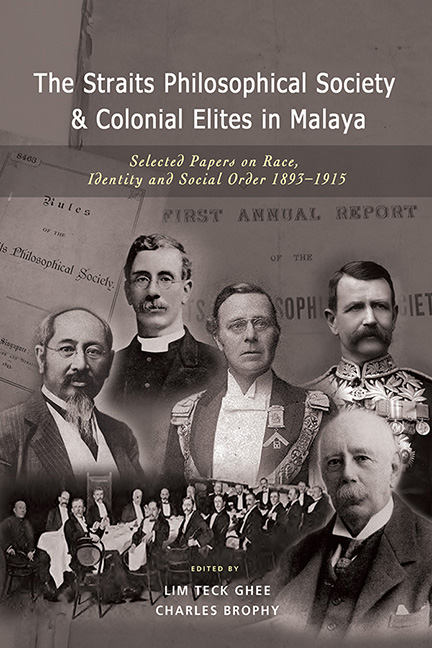 The Straits Philosophical Society and Colonial Elites in Malaya
The Straits Philosophical Society and Colonial Elites in Malaya 27 - Moslem Influence on the Malay Race
Published online by Cambridge University Press: 09 January 2024
Summary
Editors’ Note
The engagement of the Society with missionary thinking on the native population can be found in two contributions by W.G. Shellabear in the 1910s: “Moslem Influence on the Malay Race” and “Mohammedanism, As Revealed in Its Literature”. As Robert Hunt has argued, Shellabear was central to the re-evaluation of the role of Islam in Malay society, challenging assumptions of Islam as a mere veneer over Malay society, and arguing for the need for missionaries to understand the true nature of Malay society, and to contribute towards the modernization and development of the Malays as part of the colony.
Yet whilst his assessment of the role of Islam differed from the majority missionary opinion of the time, the fundamental thrust still assumed a strong opposition between the values of Islam and those of European thought. Although Shellabear provided a more prominent role for Islam in the development of Malay society, at the same time he saw its civilizing role as limited compared for example to earlier Hindu influence. In doing so, Shellabear would take up an Orientalist focus upon language and texts to better understand the Malays, which would also be prominent in his subsequent essay “Mohammedanism, As Revealed in Its Literature”. This approach was one which Tan Teck Soon would criticize for its focus on textualism as opposed to living culture.
Shellabear argued that comparing the list of Malay words derived from Arabic and those derived from Sanskrit, it was obvious that Hinduism was “by far the more effective civilising agency”. Later in the same essay he would argue that the influence of Islam on the Malays was largely restricted to the sphere of religion, and to terminology for books and writing, but not for the language of government and commerce where the adoption of words from European and Chinese languages suggested that “the Chinese and European peoples have done infinitely more than the Arabs to give the Malays the fruits of civilization”.
- Type
- Chapter
- Information
- The Straits Philosophical Society and Colonial Elites in MalayaSelected Papers on Race, Identity and Social Order 1893-1915, pp. 385 - 412Publisher: ISEAS–Yusof Ishak InstitutePrint publication year: 2023


